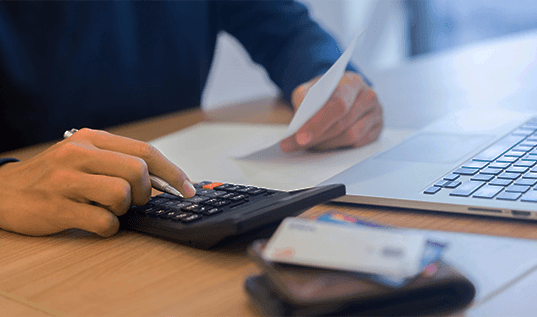In this article
Check your credit score today
Check your score and get tips to improve it. It’s free, forever.
How to get a personal loan
Are you looking to apply for a personal loan? Here is a step by step guide.

In this article
Check your credit score today
Check your score and get tips to improve it. It’s free, forever.
What can you do when you face a financial emergency and don’t have enough funds to pay? The answer is simple -- borrow a personal loan.
A personal loan gives you the advantage of using the cash flow for varied purposes instead of just one. But getting approved for one isn’t always as easy as it seems.
Not sure how to go about getting a personal loan?
Here’s everything you need to know before you apply for a personal loan.
A personal loan refers to short-term financing extended by banks, credit unions, online marketplace lenders, and peer-to-peer lenders.
The proceeds of a personal loan can be used for any personal reason, such as paying for a wedding, paying off other debt, or carrying out home renovation projects. Usually, personal loans are unsecured and don’t have collateral, such as a car or a house, backing them.
Like other loans, credit score plays a crucial role in the personal loan application process. In case you don’t have a solid credit history, offering collateral to the lender is an option you can consider.
Here’s an easy-to-follow guide to how to get a bank loan:
1 - Calculate how much money you need to borrow
Before the lenders tell you how much loan you can borrow, do your homework and find out how much you want to borrow. Keep in mind that loan origination and processing fees are also considered part of the sanctioned proceeds and are deducted before the funds are deposited into your account. So make sure you are borrowing enough to meet your requirements post deductions.
Taking out a personal loan you don’t have the means to repay is also terrible news for your credit health as payment defaults damage your credit score. Before applying for loans, use a calculator to determine how much you need to pay monthly toward repayment.
Getting an estimate of the instalments gives you a fair indication of whether you have the budget to handle it. Even though you may not know the exact interest rate and repayment tenure offered, you can play around with different variations based on information available in the public domain. After all, you don’t want to apply for a loan only to default and ruin your credit score, affecting your chances of borrowing in the future.
2 - Look up your credit score
Credit score is a critical factor that lenders consider when sanctioning any loan. It indicates your creditworthiness, based on which a bank decides the risk of lending involved.
Even though there is no minimum credit score for personal loan in Australia that guarantees sanction, having a score on the higher end helps to secure the lending on favourable terms and better interest rates.
Apart from credit reporting bodies, you can access your credit report and check credit score by signing up with ClearScore
Knowing your credit score before you shoot off loan applications also gives you a fair idea of how much you can expect to borrow. Moreover, noticing a low score on your credit report allows you to improve it before you start the application process.
And in case you don’t have enough time to boost your score, you can still apply for personal loans for bad credit by approaching specialised lenders.
3 - Shortlist the lenders you can borrow from
Knowing the different avenues where you can apply for a loan is critical.
If traditional banks are reluctant to approve your application, consider approaching credit unions. You can also get loans from specialised bad-credit lenders if your credit score is not great.
Lastly, payday lenders are also an option, although such loans may be more expensive than traditional ones.
4 - Check if you need a co-signer or offer collateral
When applying for a loan, having a co-signer can help if your credit score doesn’t meet the cut-off set by the lender. It can help you to get a personal loan at a favourable interest rate.
If you don’t have the option of a co-signer, you can consider a secured loan, as they are easier to qualify for. In the case of secured loans, you need to provide collateral whose value matches the amount of loan you are borrowing. A failure to repay the loan entitles the lender to seize your collateral and sell it off to satisfy the outstanding debt.
5 - Decide what type of loan you want to borrow
All loans are not created equal -- so how to get a loan that matches your needs?
Know why you want a loan and whether the lender will allow you to borrow for the desired purpose. This is vital as it saves you from the hassle of applying for loans, the proceeds of which you can’t use as per your needs.
For example, you may get a loan to pay for a vacation, only to find out that the proceeds cannot be used for travel costs. Knowing whether a lender offers a loan meant for the end use you have in mind is key before you apply for a personal loan.
Here are some popular options to consider:
Debt consolidation loans: They can be used to pay off your existing debt and reduce your monthly payment while saving on interest.
Credit card refinancing loans: You can get a personal loan to pay off credit card debt over a longer period.
Emergency loans: If you need a substantial amount of money urgently for an unforeseen event, you can consider an emergency loan.
Home improvement loans: They are a good choice if you need to carry out urgent renovations or repairs to your house without going out of pocket or taking out a second mortgage.
Medical loans: Taking out a personal loan may help reduce your financial burden of urgent medical expenses that your health insurance may not cover.
6 - Shop around for the best lender
How can I get a loan from the lender best suited to my requirements?
You don’t have to sign the first offer that comes your way. Since you will carry the burden of repayment for a considerable period, comparing different lenders and what they offer is important. Visit the websites of individual lenders or use online portals to compare the options available.
This process will also help you to identify lenders who pre-qualify applicants by running a soft credit check that doesn’t impact credit scores. Pre-qualification tells you exactly how much loan you will be sanctioned and at what interest rate.
7 - Start the application process
Once you have selected a lender, it is time to apply formally.
Fill out the application form, online or offline. Ensure to attach the necessary documents to support your application. Typically, most lenders require personal identification documents, salary slips, tax returns, proof of employment, and a list of assets and liabilities to evaluate an application, though the exact requirements may vary.
Can you borrow a personal loan without a bank statement? Typically, lenders need a bank statement to determine whether you have sufficient liquidity to pay off the loan though it may vary on a case-to-case basis.
How long does personal loan approval take? The timelines vary depending on the lender you are approaching. If pre-qualified, personal loan approval may come through in a couple of hours. Otherwise, you may have to wait for a few days.
How much loan you can borrow depends on several factors, such as your credit profile, age, and current employment status.
Lenders also use a debt-to-income ratio to determine a borrower’s repayment capacity, which is crucial in determining the amount they are eligible to borrow.
The amount of loan you can borrow can vary depending on whether you plan to offer collateral. If you opt for collateralised loans, you have a better chance of getting approved for a higher amount.
Can I get a personal loan even if my credit score is not good?
You can approach bad credit lenders if you can’t get a loan from traditional banks and financial institutions because of your poor credit score. Such specialised lenders provide personal loans to borrowers with bad credit. However, you may need to pay a higher interest and enjoy less favourable terms than a regular loan.
The amount varies depending on the lender you approach, your credit score, current income, and outstanding debts. Most lenders review the monthly income of applicants against their outstanding liabilities before approving a loan.
Typically, a lender may not approve a hefty sum if your credit score is not impressive and you have several outstanding debt obligations to meet.
The lender decides the repayment tenure of a personal loan. It depends on your loan amount, regulatory restrictions, and the interest rate charged.
Some lenders may allow you to prepay the loan ahead of scheduled repayment. Some lenders may levy prepayment penalties for such repayments. Read through the loan agreement carefully to know the terms and conditions.
Knowing how to apply for a personal loan can save you from unnecessary hassle and last-minute surprises.
Once you have decided that borrowing a personal loan is the best financing option for you, follow the steps above to sail through the process.
Doug loves to work with lenders to get ClearScore users the best deals
